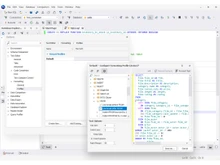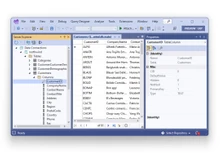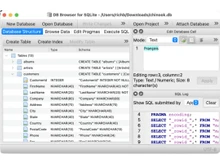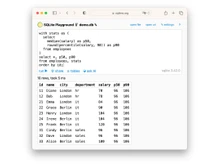Among Database Management tools, the Relational Database Model is highly favored. This model helps arrange data into tables, consisting of rows and columns known as Relations. PostgreSQL and SQLite are two of the most widely used open-source RDBMS (Relational Database Management Systems).
If you're trying to decide between SQLite and PostgreSQL databases, we will give you all the information you need to make the right choice on this comparison page. Here, we will explain the differences between the two, including their strengths and weaknesses, features, and other metrics like architecture, scalability, and more. Whether you're a professional developer or a beginner, this write-up will help you understand which database is best for your project.
SQLite vs. PostgreSQL: An Overview
SQLite is a lightweight, embedded relational database management system. It is widely used due to its simplicity, low resource consumption, and self-contained nature. It implements most of the SQL standards and supports advanced features like transactions and indexing. SQLite stores the entire database in a single file and is accessible through multiple programming languages including C/C++, Java, Python, etc., making it the perfect choice for compact and fast local storage in applications.
PostgreSQL (known as Postgres) is also an open-source object-relational database management system (DBMS) suitable for small to large-scale deployments. It offers advanced features like MVCC, data integrity, and support for multiple programming languages. Apart from that, PostgreSQL provides scalability, reliability, and extensive SQL support along with a vibrant open-source community. The operating system compatibility includes Linux, macOS, and Windows.
SQLite vs. PostgreSQL: Key Differences
The key differences between PostgreSQL and SQLite are as follows:
- SQLite and other SQLite alternatives are serverless and embedded within applications, while PostgreSQL requires a database server.
- SQLite supports fewer data types compared to PostgreSQL.
- Both databases have their limitations. For example, SQLite struggles with large amounts of data while PostgreSQL is not suitable for certain speed requirements or simple setups.
- In comparison to PostgreSQL, SQLite is more portable.
- SQLite lacks multi-user access management, while PostgreSQL and a few other PostgreSQL alternatives support simultaneous access.
- SQLite has a smaller setup size compared to PostgreSQL.
- SQLite is an ideal option when you have limited resource requirements and do not require network access. In contrast, PostgreSQL is better when data integrity, integration with other tools, or complex operations are important.
- PostgreSQL offers more functionality and features compared to SQLite.
- SQLite is faster in terms of performance but lacks security features, while PostgreSQL offers more security options.
SQLite vs. PostgreSQL: In Terms of Features
- Database Model: SQLite is based on a relational model. PostgreSQL uses an object-relational model. SQLite organizes data into tables with rows and columns. On the other hand, PostgreSQL uses an object-relational model, allowing for more advanced features like custom data types and inheritance in addition to the traditional relational model capabilities.
- Setup Size: SQLite is known for its lightweight nature, making it suitable for small devices with limited resources. In contrast, PostgreSQL requires more disk space and resources due to its robust feature set, making it better suited for larger applications with high data volumes and complex requirements.
- Supported Data Types: When it comes to supported data types, SQLite is limited to basic data types like text, integer, and floating-point numbers. In comparison, PostgreSQL offers a wider range of options, including arrays and the ability to define and use custom data types. This flexibility in data types allows for more diverse and complex data modeling and storage capabilities.
- Portability: SQLite is highly portable and can be used across various platforms and operating systems, making it a popular choice for applications that require flexibility. On the other hand, PostgreSQL is limited to specific operating systems, which could restrict its portability and require additional effort for deployment and maintenance.
- Multiple Access: SQLite allows only one concurrent connection at a time, making it suitable for single-user or embedded applications. In contrast, PostgreSQL supports multiple concurrent connections, allowing multiple users or applications to access the database simultaneously. This feature makes PostgreSQL better suited for multi-user environments, such as client-server applications or web-based systems.
SQLite vs. PostgreSQL: Scalability & Deployment
SQLite is not appropriate for deployments on a large scale with significant traffic because it is designed for usage on a single system. Contrarily, PostgreSQL is made to scale both horizontally and vertically, which means that it can manage massive volumes of data or traffic just by adding a cluster of servers and enhancing the capabilities of a single server.
SQLite vs. PostgreSQL: Architecture
PostgreSQL, on the one hand, is a client-server-based DBMS that needs a separate server for handling database requests. On the other hand, SQLite is a serverless database management system that can be incorporated directly into an application.
SQLite vs. PostgreSQL: Data Types
SQLite supports several data types organized into classes such as numeric, string, and date and time. On the other hand, PostgreSQL supports advanced data types including numeric, string, date, and time, geometric, network address, bit string, text search, and JSON.
SQLite vs. PostgreSQL: User Interface
SQLite is lightweight and versatile, making it great for embedded systems and mobile applications. PostgreSQL is robust and reliable, which makes it suitable for applications that require advanced data processing and storage for large databases.
SQLite vs. PostgreSQL: Performance
In terms of Performance, PostgreSQL is considered to be better than SQLite, as it is faster and more efficient than SQLite. Moreover, it can also handle large amounts of data and multiple concurrent users due to its multi-process architecture.
Which Is Better, SQLite or PostgreSQL?
In conclusion, SQLite as well as PostgreSQL are both open-source RDBMS (relational database management systems). However, SQLite is lightweight, embedded, and suitable for local storage with limited resources. On the other hand, PostgreSQL is scalable, reliable, and offers extensive SQL support with advanced features. SQLite is more portable and has a smaller setup size, while PostgreSQL requires a separate server and more resources. PostgreSQL outperforms SQLite in terms of performance, scalability, and multi-user access.


 3 Ratings & 0 Reviews
3 Ratings & 0 Reviews






















